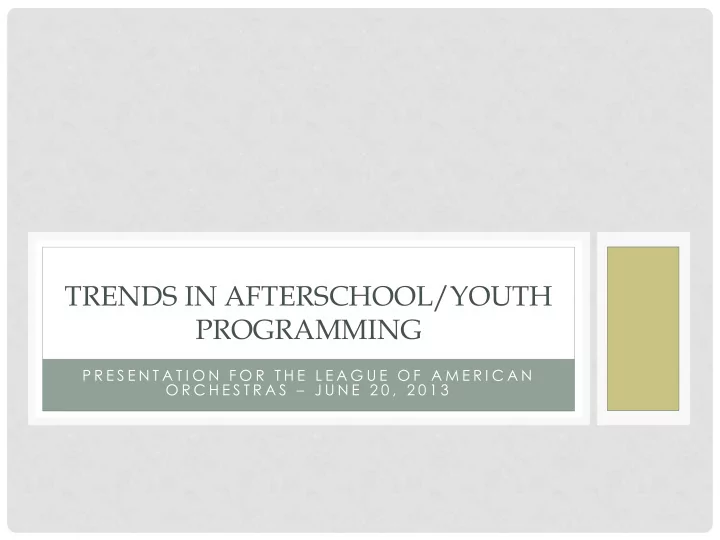

TRENDS IN AFTERSCHOOL/YOUTH PROGRAMMING P R E S E N T A T I O N F O R T H E L E A G U E O F A M E R I C A N O R C H E S T R A S – J U N E 2 0 , 2 0 1 3
LESLIE SCHEULER, PHD • President of LS Associates, a consulting collaborative that specializes in research, evaluation and program planning for education, arts and culture, human service, health, and business. • Experience working with orchestras through the Magic of Music initiative: evaluation of outreach programming • Evaluation of education programs for the Saint Louis Symphony, New York Philharmonic, Philadelphia Orchestra and Dallas Symphony Orchestra • Extensive experience in evaluating arts-integrated human service and arts education programs
THE DEMAND FOR YOUTH PROGRAMMING HAS SKYROCKETED….. Driven by: The need to find productive activities for children and youth while parents work The need to augment the school day with learning and enrichment activities that support student success and healthy youth development Over the years, afterschool programming has evolved to become more structured and more goal- oriented with a special focus on low-income or otherwise disenfranchised populations (narrowing the gap).
THE POTENTIAL…. Quality afterschool programming and programs for at-risk youth have the potential to produce outcomes like: Improved social skills and interpersonal behavior Improved grades, test scores and work habits Reduced disciplinary problems and risk-taking behavior
YOUTH DEVELOPMENT Building “assets” rather than focusing on problems/deficits Broadly based but best practice and asset-driven • Boys & Girls Clubs, YMCA and YWCA, Girls Inc., Teen Outreach program, prevention programs, summer programs, etc. • The Search Institute • The Wallace Foundation
QUALITY PROGRAMS… Best practices in effective afterschool and youth development programs include: Well-defined goals and outcomes (standards- aligned) Clear and specific plans for implementation A focus on building transferable skills The development of positive, supportive relationships between adults and youth Services/activities provided on a consistent basis and intensively enough to create impact Strategies for evaluating effectiveness
THE OPPORTUNITY… To raise student achievement, a number of schools/districts are moving to extended days; some are using the extra time to restore arts education to their curricula As arts organizations become more involved with schools, concern has increased that their involvement will replace certified arts teachers It’s important to strongly advocate for the retention or re-introduction of certified arts educators in our school systems
WHAT MUSIC PROGRAMS CAN DO… Improve student focus and concentration Improve self confidence and self-presentation skills Improve teamwork and collaboration with peers Facilitate creative self expression Strengthen cultural diversity and cultural identity Arts programs are especially effective at giving children/youth who do not excel academically the opportunity to “shine” -- to succeed and gain recognition from adults and peers for special talents. Very effective in building parent involvement.
A GROWING BODY OF EVIDENCE SHOWS… • The arts can be an important part of promoting the health and welfare of youth while preventing social problems like delinquency and violent behavior • The arts also make important contributions to the health and welfare of neighborhoods and urban areas, contributing to quality of life and the “ liveability ” of our communities
FUNDING SOURCES Federal: 21 st Century Community Learning Center programs, Urban Education grants State Departments of Education Local governments Youth development grants of private foundations Community foundations
Leslie Scheuler leslie@ls-associates.net 314.422.1050
Recommend
More recommend